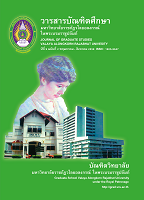รูปแบบความสัมพันธ์เชิงสาเหตุของปัจจัยส่วนประสมทางการตลาดบริการที่มีผลต่อความรับผิดชอบต่อสังคมและคุณค่าตราสินค้าในใจผู้ใช้บริการธุรกิจค้าปลีกประเภทไฮเปอร์มาร์เก็ตในประเทศไทย A CASUAL RELATIONSHIP MODEL OF SERVICE MARKETING MIX AFFECTING THE CORPORATE SOCIA
Main Article Content
บทคัดย่อ
บทคัดย่อ
การศึกษาวิจัยนี้ มีวัตถุประสงค์ 1) เพื่อศึกษาความรับผิดชอบต่อสังคมและคุณค่าตราสินค้าในใจผู้ใช้บริการ 2) เพื่อศึกษาปัจจัยส่วนประสมทางการตลาดบริการที่มีผลต่อการตัดสินใจของผู้ใช้บริการ และ3) เพื่อนำเสนอรูปแบบความสัมพันธ์เชิงสาเหตุของปัจจัยส่วนประสมทางการตลาดบริการที่มีผลต่อความรับผิดชอบต่อสังคมและคุณค่าตราสินค้าในใจผู้ใช้บริการธุรกิจค้าปลีก ประเภทไฮเปอร์มาร์เก็ต ในประเทศไทย เป็นการวิจัยเชิงสำรวจและพัฒนา โดยใช้แบบสอบถามเป็นเครื่องมือเก็บรวบรวมข้อมูล สถิติวิเคราะห์ข้อมูล ได้แก่ การแจกแจงความถี่ ค่าร้อยละ ค่าเฉลี่ยและค่าส่วนเบี่ยงเบนมาตรฐาน สถิติอ้างอิงทดสอบสมมติฐานและค้นหารูปแบบด้วยการวิเคราะห์โมเดลสมการโครงสร้าง
ผลการวิจัย พบว่า กลุ่มตัวอย่างผู้ใช้บริการเห็นว่า ธุรกิจค้าปลีกไฮเปอร์มาร์เก็ต มีความรับผิดชอบต่อสังคมโดยภาพรวมที่ระดับมาก ในด้านมนุษยธรรม เศรษฐกิจ กฎหมายและจริยธรรม ตามลำดับ สำหรับคุณค่าตราสินค้าในใจผู้ใช้บริการ พบว่า การตระหนักรู้ตราสินค้านั้นจะมีการจดจำ รู้จักและตอบคำถามได้ถูกต้องในตราสินค้าเทสโก้ โลตัส และบิ๊กซี การระลึกได้จะนึกถึงตราเทสโก้ โลตัสเป็นอันดับแรก ส่วนภาพลักษณ์ตราสินค้าโดยภาพรวมทั้งสองตราสินค้า จะมีความแข็งแกร่ง เป็นที่ชื่นชอบและมีความโดดเด่นจัดอยู่ในระดับมาก ทั้งนี้ ความสำคัญต่อปัจจัยส่วนประสมทางการตลาดบริการที่มีผลต่อการตัดสินใจใช้บริการโดยภาพรวมที่ระดับมาก สำหรับรูปแบบความสัมพันธ์เชิงสาเหตุของปัจจัยส่วนประสมทางการตลาดบริการที่มีผลต่อความรับผิดชอบต่อสังคมและคุณค่าตราสินค้าในใจผู้ใช้บริการธุรกิจค้าปลีกไฮเปอร์มาร์เก็ต ในประเทศไทยที่ระดับนัยสำคัญทางสถิติ 0.05 พบว่า 1) ส่วนประสมทางการตลาดบริการมีความสัมพันธ์ทางตรงต่อความรับผิดชอบต่อสังคม รวมถึงมีความสัมพันธ์ทางตรงและทางอ้อมต่อคุณค่าตราสินค้าโดยผ่านความรับผิดชอบต่อสังคม 2) ความรับผิดชอบต่อสังคมมีความสัมพันธ์ทางตรงต่อคุณค่าตราสินค้า และ 3) ตราสสินค้าของธุรกิจค้าปลีกไฮเปอร์มาร์เก็ต ไม่มีความสัมพันธ์ทางตรงต่อส่วนประสมทางตลาดบริการ ความรับผิดชอบต่อสังคมและคุณค่าตราสินค้า ทั้งนี้ รูปแบบความสัมพันธ์เชิงสาเหตุฯ ที่พัฒนาขึ้นมีความสามารถในการพยากรณ์ได้ในระดับดีและเป็นที่ยอมรับ คิดเป็นร้อยละ 85.0 และ 41.0 ตามลำดับ ซึ่งผ่านเกณฑ์พิจารณาที่ร้อยละ 40 ขึ้นไป
ABSTRACT
The purposes of this research were 1) to study the corporate social responsibility and brand equity on the consumer-based 2) to study the factors of service marketing mix affecting the decision-making on consumer-based and 3) to present a casual relationship model of service marketing mix affecting the corporate social responsibility and brand equity on consumer-based within the retail business: Hypermarket in Thailand. This research was the survey research and development. The data were collected by using questionnaires. The statistical analysis used was frequencies distribution, percentages, mean and standard deviation. Referable statistics for hypothesis test and statistical search were calculated for Structural Equation Model (SEM).
The results showed that the samples considered the retail business: Hypermarket, in Thailand, had corporate social responsibility at high level; comprising philanthropy, economical, legal and ethical sectors respectively. For brand equity, the samples mostly had brand awareness because of its recognition for Tesco Lotus and Big C. They recalled Tesco Lotus brand, firstly. The brand image of both Tesco Lotus and Big C was strength, favorability and outstanding at high level. Service marketing mix affecting a consumer's decision on service using the retail business: Hypermarket in Thailand was considered an important at high level. A casual relationship model of service marketing mix affecting the corporate social responsibility and brand equity on consumer-based within the retail business: Hypermarket in Thailand, at a statistical significance of the 0.05, indicated that 1) the service marketing mix had direct effect on corporate social responsibility as well as direct and indirect effect on brand equity via corporate social responsibility. 2) the corporate social responsibility had direct effect on brand equity and 3) the brand of retail business had not direct effect on service marketing mix, corporate social responsibility and brand equity. For a developed causal relationship model, it was created consistently with empirical data and had an ability to predict at good level, acceptably. As a consequence of the correlation was 85% and 41% respectively, which the acceptance of correlation was more over than 40%.
Article Details

อนุญาตภายใต้เงื่อนไข Creative Commons Attribution-NonCommercial-NoDerivatives 4.0 International License.
บทความทุกเรื่องได้รับการตรวจความถูกต้องทางวิชาการโดยผู้ทรงคุณวุฒิ ทรรศนะและข้อคิดเห็นในบทความ Journal of Global of Perspectives in Humanities and Social Sciences (J-GPHSS) มิใช่เป็นทรรศนะและความคิดของผู้จัดทำจึงมิใช่ความรับผิดชอบของบัณฑิตวิทยาลัย มหาวิทยาลัยราชภัฏวไลยอลงกรณ์ ในพระบรมราชูปถัมภ์ กองบรรณาธิการไม่สงวนสิทธิ์การคัดลอก แต่ให้อ้างอิงแหล่งที่มา


